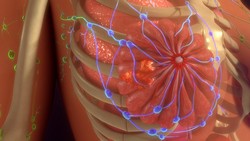Breast cancer metastasis targeted for therapy
One of the intriguing characteristics of breast cancer is metastasis at a very early stage. Blocking the metastatic potential of cancer cells is emerging as an attractive therapeutic approach. It is well-established that solid tumours exhibit low oxygen levels, a phenomenon known as hypoxia. Hypoxia inducible factor (HIF) is the main transcription factor involved in the cellular hypoxic response and under normal oxygen conditions, HIF activity is counteracted by the oxygen sensor enzymes, HIF-prolyl hydroxylases (PHD1-3). Emerging evidence indicates that pre-clinical haploinsufficiency of PHD2 in tumour and stromal cells reduced metastasis by 80 %. Scientists of the EU-funded PHD2 IN METASTASIS (Dissecting the role of HIF-prolyl-hydroxylase 2 (PHD2) in breast cancer metastasis – identifying novel therapeutic targets) project proposed to dissect how the PHD2-blockade inhibits tumour cell dissemination and metastasis at the molecular level. In this context, they employed a spontaneous model of breast cancer, which recapitulated all clinically relevant stages of breast cancer progression. Researchers identified two underlying mechanisms that explain the reduction in metastasis. They observed that PHD2 is implicated in the paracrine crosstalk between cancer cells and stromal cells through TGF-1β. In particular, silencing of PHD2 reduced the activation of cancer-associated fibroblasts (CAFs) and normalised tumour vessels, resulting in fewer cancer cells escaping to form metastases. CAFs reciprocally affect cancer cell invasion by modulating the extracellular matrix. In another part of the project, scientists investigated the therapeutic relevance of fatty acid synthase (FAS). Their results indicated that FAS inhibition reduced the proliferation of endothelial and cancer cells. Insight into the mechanism revealed that the kinase mechanistic target of rapamycin (mTOR) was post-translationally modified upon FAS silencing, resulting in reduced protein synthesis and subsequently reduced proliferation. Collectively, the results of the PHD2 IN METASTASIS study underscore the interplay between cellular metabolism and central signalling pathways in cancer that could be exploited therapeutically.







